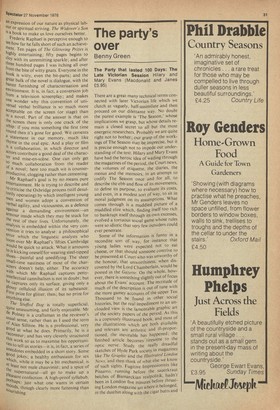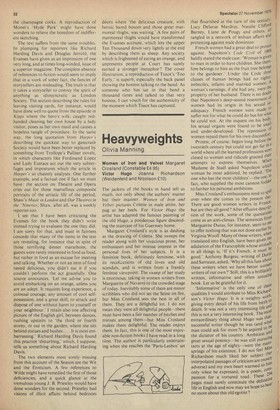The party's over
Benny Green The Party that lasted 100 Days: The Late Victorian Session Hilary and Mary Evans (Macdonald and Janes £5.95)
There are a great many technical terms connected with later Victorian life which we clutch at vaguely, half-assimilate and then proceed on our dilettante way. No doubt the purest example is 'The Season,' whose implications we grasp, but whose details remain a closed secret to all but the most energetic researchers. Probably we are quite right not to bother; our grasp of the workings of The Season may be imprecise, but it is precise enough not to impede our understanding of the text. Hilary and Mary Evans have had the heroic idea of wading through the magazines of the period, the Court news, the volumes of etiquette, the diaries, the menus and the memoirs, in an attempt to codify The Season once and for all, to describe the ebb and flow of its movements, to define its purpose, to evaluate its costs, and even, in a modest sort of way. to sit in moral judgment on its assumptions. What comes through is a muddied picture of a muddled elite which, finding itself too rich to bankrupt itself through its own excesses, evolved a tortuous social game whose rules were so idiotic that very few outsiders could ever penetrate.
Some of the information is funny in a recondite sort of way, for instance that young ladies were expected not to eat cheese. or that should someone contrive to be presented at Court who was unworthy of the honour, that unworthiness, when discovered by the Lord Chamberlain, would be posted in the Gazette. On the whole, however, there is something slightly out of focus about the Evans' account. The rectitude of much of the description is out of tune with t he more gamey accounts of the upper Ten Thousand to be found in other social histories, but the real impediment to an unclouded view is the lamentable graphic art of the society papers of the period. As this is a copiously illustrated book, and most of the illustrations which are both available and relevant are arthritic and ill-proportioned, the inevitable has happened; the finished article becomes tiresome to the optic nerve. Study the really dreadful sketches of Hyde Park society in magazines like The Graphic and the Illustrated London News, and then think of what else we know of such sights. Fugitive Impressionists like Pissarro, running before the sauerkraut belches of Bismarckian realPolitik, hadn't been in London five minutes before thrusting London magazine art where it belonged, in the dustbin along with the cigar butts and
the champagne corks. A reproduction of Monet's 'Hyde Park' might have done wonders to relieve the boredom of indifferent sketching.
The text suffers from the same troubles. In plumping for reporters like Richard Harding Davis and Douglas Jerrold, the Evanses have given us an impression of one very long, and at times long-winded, issue of
a superior magazine. The complete absence of references to fiction would seem to imply that in a work of sober fact, the fancies of storytellers are misleading. The truth is that it takes a storyteller to convey the spirit of anything as idiosyncratic as London Society. The section describing the rules for leaving visiting cards, for instance, would have done well to quote from the episode in Kipps where the hero's wife, caught redhanded cleaning her own house by a lady visitor, poses as her own maid and causes a hopeless tangle of procedure. In the same way, the long quotation from Harper's describing the quickest way to gatecrash Society would have been better replaced by something from Trollope's Palliser novels, in which characters like Ferdinand Lopez and Lady Eustace act out the very subterfuges and impostures which the article in Harper's so chastely analyses. One further example, and a factual one if fact we must have: the section on Theatre and Opera cries out for those marvellous composite portraits of the artistic life of the period, Shaw's Music in London and Our Theatres in the 'Nineties; Shaw, after all, was a weekly reporter too.
I see that I have been criticising the Evanses for the book they didn't write instead trying to evaluate the one they did. I am sorry for that, and must in fairness concede that many of the items in the text are revealing, for instance that in spite of those terrifying dinner marathons, the guests were rarely interested in food as food, but rather in food as an excuse for meeting and talking. Whether or not an item of food tasted delicious, you didn't eat it if you couldn't perform the act gracefully. One source announces, 'Let me advise you to avoid embarking on an orange, unless you are an adept. It requires long experience, a colossal courage, any amount of cool selfpossession, and a great skill, to attack and dispose of one without harm to yourself or your neighbour.' I retain also one affecting picture of the English girl, between dances, rushing upstairs to 'the third or fourth storey, or out in the garden, where she sits behind statues and bushes It is most embarrassing.' Richard Harding Davis found this practice 'disturbing,' which, I suppose, tells us something about Richard Harding Davis.
The two elements most sorely missing from this account of the Season are the Wit and the Eroticism. A few references to Wilde might have remedied the first of those deficiencies, and a quick glance at the tremulous young J. B. Priestley would have done wonders for the second. Priestley had visions of illicit affairs behind bedroom
doors where 'the delicious creature, with heroic bared bosom and those great marmoreal thighs, was waiting.' A few pairs of marmoreal thighs would have transformed the Evanses account, which lets the upper Ten Thousand down very lightly at the end by describing them as sheep. Any society which is frightened of eating an orange, and unpresents people at Court has surely earned a stronger metaphor ? The cover illustration, a reproduction of Tissot's 'Too Early,' is superb, especially the back panel showing the hostess talking to the band. As someone who has sat in that band a thousand times and talked to that very hostess, I can vouch for the authenticity of the moment which Tissot has captured.











































 Previous page
Previous page